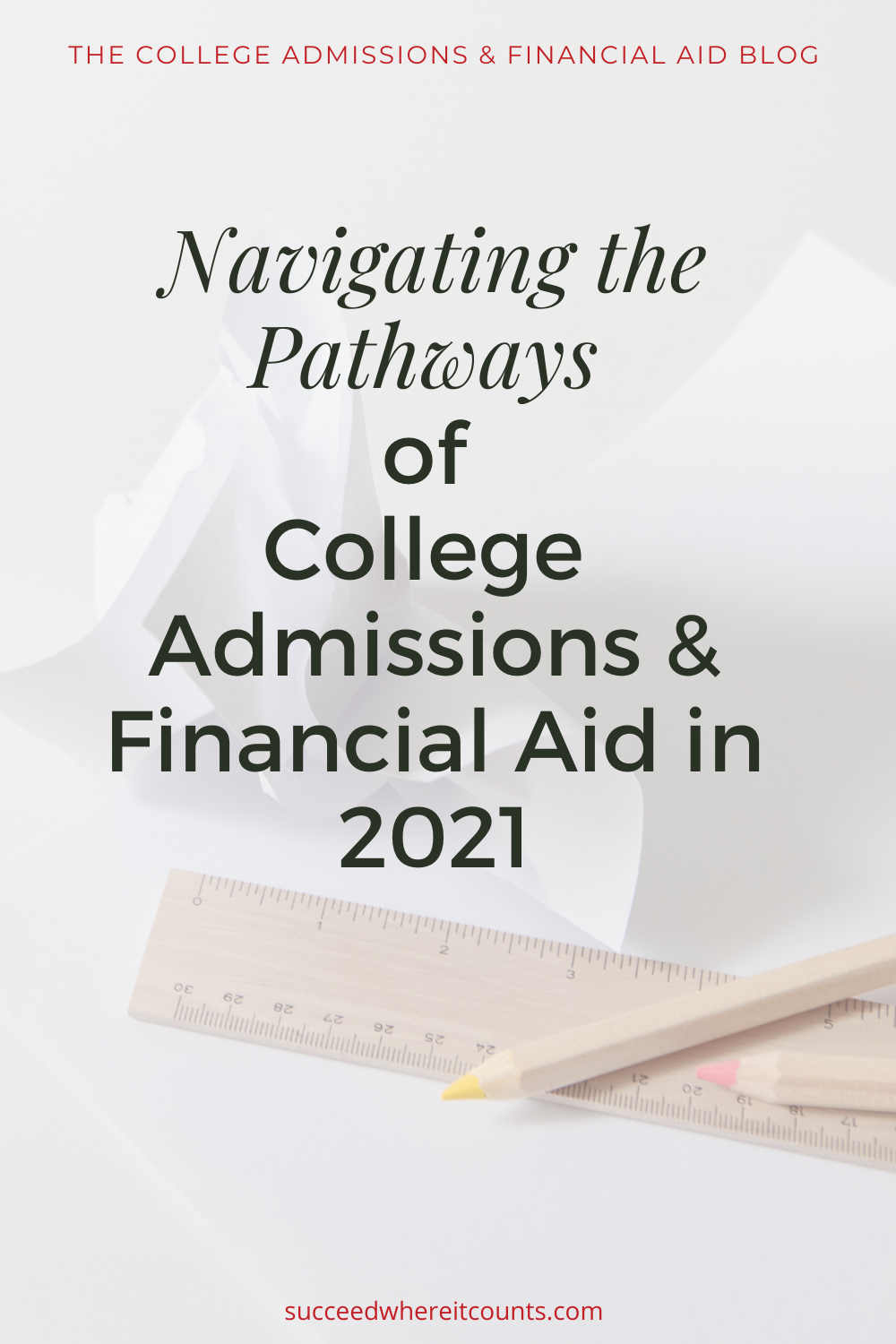January 9, 2021
Pandemic Pandemonium
If you feel that the pathways of college admissions and financial aid are labyrinthine, I would not challenge you about that perception. "Straightforward" is an adjective few veterans of the processes would use.
Merriam-Webster Dictionary defines pandemonium as a chaotic situation (https://www.merriam-webster.com/dictionary/pandemonium). Who could argue with that as apt, standing as we are just inside the doorstep of 2021? Sadly, for us all, the current pandemic is adding confusion to the chaos.
 What were high school students (grades 10 and 11, in particular) doing at this time last year? They were marking their calendars for campus visits. High school seniors were making calculated decisions about at which college to matriculate, from among several letters of acceptance. Campus life was a much more exciting prospect to those seniors than to their parents.
Then March arrived, along with the national, two-week shut-down to flatten the curve. Longest two weeks of my life! How about yours? So many excited first-year students have suffered through "virtual" higher education, and many from their parents' homes. I wonder how many parents now wish their college student was, in fact, away at college?
What will life look like for current high school seniors, come August, 2021? I have no idea; nor do the colleges; nor does anyone I know of, save the Lord God.
Here are my suggestions for 2021:
· High school seniors plan on campus life, somewhat modified by COVID-19 restrictions. However, also develop an at-home contingency plan. That includes re-organizing space in your house to create a dedicated study room. Include purchasing a new laptop computer with software suitable to the demands of college. Ask your college(s) what they recommend; particularly in your proposed major. For example, one of my former students, and now a rising college senior, needed a very sophisticated software program, with correspondingly powerful processors, for her engineering classes this past fall. Her plan to share with classmates was cancelled by the fact that she could not meet with any of them, even though she was living in a university-owned apartment, conveniently off-campus.
· High school juniors double down on your efforts for campus visits. Contact the colleges on your "Top Six" list. Ask about visiting. For campuses offering "virtual tours" only, schedule an appointment for that (or get the dates those are being offered). Write down every question you can think of. You may find yourself online with just one or two others, providing you a valuable opportunity to get some personal attention. Furthermore, be certain you set foot on the college campuses you are seriously considering, even if it is a private, unscheduled and unofficial visit. It is important that you see the campus, walk around the grounds, and visualize yourself there. Does it feel like the right place for you?
· High school sophomores surely, I mean surely(!) by the fall semester of 2023 campus life will have taken some form of predictability. Therefore, rather than concentrating on "Where?", concentrate on "Why?" For what reason are you going to college? To what end? Is a college education essential to your career-plans following high school? Do you know what those career plans look like? Why not? Those questions, and other similar questions, are much more important than where you will fulfill your higher education; at least for now.
One last fact to mention, and that is regarding financial aid. Big, big changes are coming to the financial aid formulae for the college years beginning Fall 2023-Spring 2024. The changes do not favor the middle class.
What were high school students (grades 10 and 11, in particular) doing at this time last year? They were marking their calendars for campus visits. High school seniors were making calculated decisions about at which college to matriculate, from among several letters of acceptance. Campus life was a much more exciting prospect to those seniors than to their parents.
Then March arrived, along with the national, two-week shut-down to flatten the curve. Longest two weeks of my life! How about yours? So many excited first-year students have suffered through "virtual" higher education, and many from their parents' homes. I wonder how many parents now wish their college student was, in fact, away at college?
What will life look like for current high school seniors, come August, 2021? I have no idea; nor do the colleges; nor does anyone I know of, save the Lord God.
Here are my suggestions for 2021:
· High school seniors plan on campus life, somewhat modified by COVID-19 restrictions. However, also develop an at-home contingency plan. That includes re-organizing space in your house to create a dedicated study room. Include purchasing a new laptop computer with software suitable to the demands of college. Ask your college(s) what they recommend; particularly in your proposed major. For example, one of my former students, and now a rising college senior, needed a very sophisticated software program, with correspondingly powerful processors, for her engineering classes this past fall. Her plan to share with classmates was cancelled by the fact that she could not meet with any of them, even though she was living in a university-owned apartment, conveniently off-campus.
· High school juniors double down on your efforts for campus visits. Contact the colleges on your "Top Six" list. Ask about visiting. For campuses offering "virtual tours" only, schedule an appointment for that (or get the dates those are being offered). Write down every question you can think of. You may find yourself online with just one or two others, providing you a valuable opportunity to get some personal attention. Furthermore, be certain you set foot on the college campuses you are seriously considering, even if it is a private, unscheduled and unofficial visit. It is important that you see the campus, walk around the grounds, and visualize yourself there. Does it feel like the right place for you?
· High school sophomores surely, I mean surely(!) by the fall semester of 2023 campus life will have taken some form of predictability. Therefore, rather than concentrating on "Where?", concentrate on "Why?" For what reason are you going to college? To what end? Is a college education essential to your career-plans following high school? Do you know what those career plans look like? Why not? Those questions, and other similar questions, are much more important than where you will fulfill your higher education; at least for now.
One last fact to mention, and that is regarding financial aid. Big, big changes are coming to the financial aid formulae for the college years beginning Fall 2023-Spring 2024. The changes do not favor the middle class.

Succeed Where It Counts
Succeed Where It Counts
Posted in College Planning, College Planning Strategies. Tagged as #collegeplanning, campus life in 2021, college admissions in 2021, Financial Aid, financial aid in 2021, Financial planning.
December 5, 2019
I'm in 11th Grade what should I be doing now for college admissions and financial aid?
The first answer is, "Keep moving." What I mean is, you don't have as much time as you may be thinking. College applications are not on your radar until next August. True. However, between now and then you have a lot to think about and decide. Financial aid is tied closely to five topics.
Here are the topics, and in reverse order.
5. Where are you going to apply?
4. Have I visited every college I am applying to?
3. What are my academic qualifications?
2. What will I major in?
1. What do I see as my future career?
 The most important question to answer, now, is "What career?" (Purchase my book here.) Going to college without an outcome in focus is a HUGE mistake. Across America, for students attending a public university at in-state, resident rates, the annual, actual costs will exceed $20,000.00. At that price, how much time can you afford to meander through five or six years to a degree? Yet, that is the mistake the majority of college students in the USA make.
My students invest in a really good career assessment. It points them in the direction of what they are suited to do (aptitude), but more importantly, what they will enjoy doing for 40 years, more or less.
For example, I am good at taking and transcribing the minutes of meetings. But I do not enjoy it very much. I am willing to do it, but if given a choice, I'd rather not. Another example is I have had students who were science scholars. A medical career might be a logical choice, right? Many of them, however, freak out at the sight of blood. So maybe something else!
Do whatever it takes to figure out what you will love doing after college, and what is required by way of academic preparation to do that. What are the prospects for earning a living in that career? Is that job market expanding or shrinking? Check out www.BLS.gov. That's the Bureau of Labor Statistics. Great website, and updated regularly.
You can read parts 2, 3 and 4 of this blog series by clicking here. Call us today for a complimentary session.
The most important question to answer, now, is "What career?" (Purchase my book here.) Going to college without an outcome in focus is a HUGE mistake. Across America, for students attending a public university at in-state, resident rates, the annual, actual costs will exceed $20,000.00. At that price, how much time can you afford to meander through five or six years to a degree? Yet, that is the mistake the majority of college students in the USA make.
My students invest in a really good career assessment. It points them in the direction of what they are suited to do (aptitude), but more importantly, what they will enjoy doing for 40 years, more or less.
For example, I am good at taking and transcribing the minutes of meetings. But I do not enjoy it very much. I am willing to do it, but if given a choice, I'd rather not. Another example is I have had students who were science scholars. A medical career might be a logical choice, right? Many of them, however, freak out at the sight of blood. So maybe something else!
Do whatever it takes to figure out what you will love doing after college, and what is required by way of academic preparation to do that. What are the prospects for earning a living in that career? Is that job market expanding or shrinking? Check out www.BLS.gov. That's the Bureau of Labor Statistics. Great website, and updated regularly.
You can read parts 2, 3 and 4 of this blog series by clicking here. Call us today for a complimentary session.
Posted in College Planning, College Planning Strategies. Tagged as Financial Aid.
August 3, 2015
A 529 Plan, should I start one? We (http://www.succeedwhereitcounts.com) hear that question, or some variation of it, often. There is no one-size-fits-all answer. Consider these facts and factors:
FACTS
-
529 Plans - established by the U.S. Congress; run by states and by colleges.
-
529 Plan - an IRS designation relating to taxability and penalties. Those two words should not be ignored. Click the link to the relevant section (http://www.irs.gov/uac/529-Plans:-Questions-and-Answers).
-
529 Plan - a cash asset available for college expenses. Your Expected Family Contributions (EFC) (http://www.fafsa.ed.gov) may go up and your financial aid offer go down.
-
529 Plans - unlimited contributions allowed (subject to the parent/child gift exclusion; refer to the IRS Q&A linked above). Large accounts, however, may leave an undistributed balance, which may be subject to taxes and penalties.
-
529 Plans may be shared within families; given to friends or anyone else.
FACTORS
-
Conservative investment practices may mitigate market risk for a 529 Plans. The flip side of that is a history of modest gains inside of 529 accounts (http://www.forbes.com/sites/learnvest/2013/07/18/529-savings-plans-9-mistakes-people-often-make/).
-
Families with large EFC-exposed assets (http://www.fafsa.ed.gov) may benefit the most from 529 Plans for the tax savings possibilities. However, the IRS gift exclusion allowance should also be considered (see Forbes article linked above).
-
Families with high Adjusted Gross Incomes (IRS 1040, line 37) may also derive a benefit from 529 Plans.
-
If scholarships and college tuition concessions are of little or no importance, the taxes saved in a 529 Plan are worth considering.
-
You have to spend the money on "qualified educational expenses," not necessarily on what you think your student needs for a particular year of college (a car; off-campus housing; airfare home at a holiday).
-
Distributions drain the account. The magic of compounding is eliminated.
-
Consider a college savings strategy that has the option of using your asset as collateral, while continuing to enjoy uninterrupted compounding growth.
Is a 529 Plan right for you? The facts and factors discussed above, when carefully considered, will help you arrive at the answer.
Posted in College Planning, College Planning Strategies. Tagged as 529 Plan, Cost of College, Financial Aid, Save for college.
January 23, 2021
FAFSA REVIEW
Frequent reminders of essential information are necessary and important. That is brought to my attention when, in conversation with a parent, the mystery and misunderstanding of FAFSA come to the front. This blog is not exhaustive in its treatment of FAFSA. I have written other blogs on the topic, including 8 common mistakes to avoid when completing FAFSA. You can read that post by clicking here. This article is the reminder you want of the basics about FAFSA.
FAFSA F ree A pplication for F ederal S tudent A id. The application is free, not necessarily will the financial aid be free. Reputable counselors (like your author) do not charge a fee to help families complete FAFSA. Other consulting services do come with a fee.
It's a data collection tool. FAFSA does not award any financial aid. There is a Student Aid Report (SAR)generated as FAFSA is completed and submitted. However, even those amounts are not set in stone. The data you provide is sent to any college you list within the FAFSA form. Those college financial aid offices make the actual awards decisions.
A loan is a loan. Every FAFSA SAR I have seen includes student loans. As with any other loan, there is paperwork to be completed, by the student, within a deadline. The requirements include signing off on a financial education module, signing a Note of Indebtedness, and signing a consent to assign the loan dollars to the college of your choice. Those dollars will be deposited in your student account, and the college will deduct appropriate charges. The balance (if any) is yours to do with as you please. There are origination charges (temporarily waived for COVID-19 relief), and interest charges that may be subsidized (i.e. paid for) by the U.S. Treasury Department. Most loans, however, are unsubsidized. That means the student owes the interest as well as the principal sum.
Annual Read more
Succeed Where It Counts
Succeed Where It Counts
Posted in College Planning, College Planning Strategies. Tagged as #fafsa, Financial Aid, paying for college.
December 21, 2020
The Free Application for Federal Student Aid FAFSA is the primary portal by which nearly everyfamily must enter. Notice the words, because in the title is the first, and most common mistake . It is a free application, it is not an application for free financial aid.In fact, the most common form of financial aid offered through FAFSA is a loan. The U.S. Department of Education reports $1.5 trillion (put 11 zeroes after that 5) in outstanding education loans. Below are examples of other, commonly made errors in completing the form. We already covered the first mistake above. It is a free application, it is not an application for free financial aid.
Year Applied for: if you go to the FAFSA website now, and begin as a new applicant, it will ask for which year you are applying: 2020-2021, or 2021-2022. Current high school seniors are applying for 2021-2022.
Social Security Number: don't guess! Know for sure, and double check you entered each one correctly; student SS#, and parent(s). Why the parenthesis? See subsequent bullet points below. FAFSA automatically sends the social security information to Social Security Administration to verify that there is such a number, and that the number is attached to the name submitted. There is an opportunity to correct an error, but it takes time.
Student or Parent: The person creating the new application is asked to identify as the student or a parent. It does not matter which, but remember whose information you are providing. Both the student and the parent(s) are asked identical, personal questions. For example, "Are you married? Are you a military veteran?", etc. A common mistake is for the student to assume the question asks about his/her parent(s). Check the section of the application. You will see a tab labeled STUDENT, or a tab labeled PARENT. Remember which section you are completing. Also, since the U.S. Supreme Court' ruling on same-sex marriage, the FAFSA form changed from " Read more
Succeed Where It Counts
Succeed Where It Counts
Posted in College Planning, College Planning Strategies. Tagged as Financial Aid, paying for college.




 Subscribe
Subscribe
